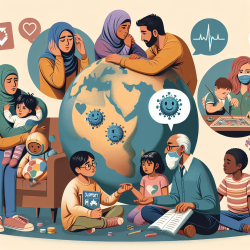Introduction
The COVID-19 pandemic has presented numerous challenges for higher education institutions (HEIs) worldwide, particularly in the United States. The research article titled Balancing finances, politics, and public health: international student enrollment and reopening plans at US higher education institutions amid the COVID-19 pandemic by Whatley and Castiello-Gutiérrez provides a comprehensive analysis of how international student enrollment influenced institutional reopening plans during the pandemic. This blog will explore how practitioners can leverage the findings of this study to improve their decision-making processes and outcomes for children in educational settings.
Understanding the Research
The study utilized resource dependence theory to examine the extent to which international student enrollment impacted the reopening strategies of US HEIs in July 2020. The findings revealed that private not-for-profit institutions were more likely to shift to in-person instruction to accommodate international students, driven by financial dependencies on tuition revenue. In contrast, public institutions did not exhibit the same behavior, with political pressures being a more significant factor in their decision-making.
Implications for Practitioners
For practitioners in speech-language pathology and educational settings, understanding the interplay between financial dependencies and institutional decision-making can provide valuable insights into creating effective strategies for supporting children. Here are some key takeaways:
- Financial Dependencies: Recognize the financial pressures that institutions face and how these can influence decisions that impact educational delivery and student outcomes.
- Data-Driven Decision Making: Use data and evidence-based practices to guide decisions, ensuring that financial considerations do not overshadow the primary goal of providing quality education and support to students.
- Advocacy for Students: Advocate for policies and practices that prioritize student well-being and educational outcomes, especially for vulnerable populations such as international students.
Encouraging Further Research
Practitioners are encouraged to delve deeper into the implications of financial dependencies on educational outcomes. Further research can explore how similar dependencies might affect other educational settings, such as K-12 schools, and what strategies can be implemented to mitigate negative impacts.
Conclusion
The research by Whatley and Castiello-Gutiérrez highlights the complex interplay between financial, political, and public health considerations in institutional decision-making during the COVID-19 pandemic. By understanding these dynamics, practitioners can enhance their ability to make data-driven decisions that prioritize student outcomes and well-being.
To read the original research paper, please follow this link: Balancing finances, politics, and public health: international student enrollment and reopening plans at US higher education institutions amid the COVID-19 pandemic.










